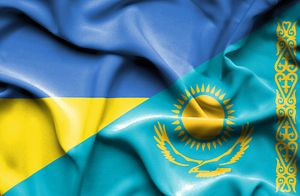As of January 1, per a decree signed by Russian President Vladimir Putin, cargo bound for Kazakhstan from Ukraine via Russian territory must transit exclusively through Belarus. According to Interfax, the decree was signed in connection with another decree suspending the four-year-old free trade agreement (FTA) between Ukraine and Russia. Russia’s decision to suspend the FTA with Ukraine came in conjunction with the entry into force of Ukraine’s agreements with the European Union to gain tariff-free access to Europe.
Russia maintains that Ukraine cannot belong to both the Commonwealth of Independent States (CIS) and European Union free trade zones.
Moscow’s decision–that trade bound for Kazakhstan transiting through Russia from Ukraine must go through Belarus first–could have seriously detrimental effects on Kazakh-Ukrainian trade. Ukraine has been one of Kazakhstan’s top five import partners fairly consistently over the past decade. In 2012, Kazakhstan imported nearly 3 billion in goods from Ukraine–third only to Russia ($17 billion) and China ($7 billion) and ahead of Germany ($2.2 billion) and the United States ($2.1 billion). In the past three years, that trade has dropped as tensions between Russia and Ukraine escalated, but not enough to lesson Ukraine’s importance to Kazakhstan. According to the Ukrainian Minister of Agricultural Policy and Food, Oleksiy Pavlenko, Central Asian states import 4 percent of all all Ukrainian agricultural exports.
Russia is designating which border posts specifically must be used for cargo from Ukraine bound for Kazakhstan. Russia, per the decree, will “establish requirements for identification means [seals], including those operating on the basis of the Glonass technology, the procedure for their placing [removal] and application in motor and rail transportation, and the procedure for the issue [submission] of record cards.” According to Interfax’s summary, “[R]ecord cards shall be deemed invalid in case drivers of motor vehicles violate the procedure for placing, removing and applying seals, including those operating on the basis of the Glonass technology.” (Glonass is the Russian version of GPS)
The Ukrainian Prime Minister Arseniy Yatsenyuk had phone calls with his counterparts in Kazakhstan and Azerbaijan and discussed the predicament. In his call with Kazakh prime Minister Karim Massimov, the Ukrainian government press service says “the sides focused attention on the problems of delivering the Ukrainian produce to Kazakhstan and conducting transit shipments.”
Yatsenyuk also told Massimov that Ukraine intends to notify the World Trade Organization–which Kazakhstan recently acceded to and which Russia has been a member of since 2012–of “Russia’s illegal actions regarding Ukrainian cargo transit and to apply the organization’s mechanisms for Russia to eliminate these violations.”
The Russian worry, of course, is that Ukraine may serve as a conduit for European goods into the larger CIS region. Much as Belarus has been accused of facilitating the re-export of European goods, Ukraine could become a node in the now illegal trade of foodstuffs from Europe to Russia. Russia added Ukraine to the list of countries subject to its food import ban a response to European sanctions on Russia. The food import ban generated dramatic scenes of bulldozers rolling over wheels of French and Italian cheeses and oranges dumped from the back of trucks into garbage heaps.

































